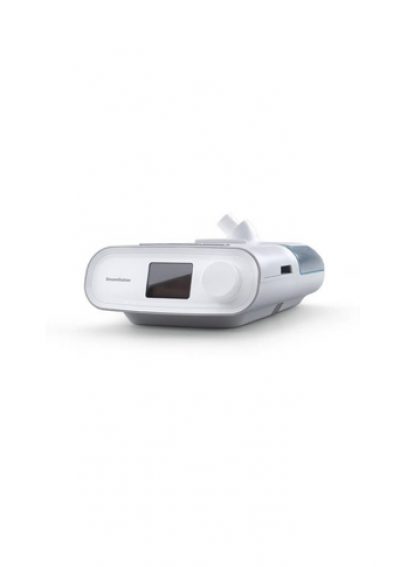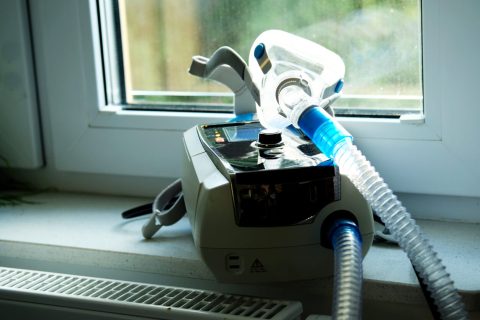Philips CPAP Recall
Philips Respironics recalled its CPAP, BiPAP and ventilator machines, including millions of Philips Dreamstation CPAP machines, in 2021. The FDA continues to receive reports of injuries and deaths from PE-PUR sound abatement foam that can degrade, causing serious health issues such as cancer.

Why Did Philips Recall Its CPAP Machines?
Philips CPAP machines were recalled because polyester-based polyurethane (PE-PUR) used to control sound and vibration in some CPAP, BiPAP and ventilator machines may break down and release toxic particles and gases that users may inhale or swallow.
The U.S. Food and Drug Administration classified the Philips CPAP recall as a Class I recall in July 2021. Class I recalls are the most serious type of recall for products that may lead to death or serious injury.
Philips said CPAP device users could inhale or ingest foam particles or gases that may cause toxic, carcinogenic and respiratory effects. Foam degradation may be worse in machines used in hot or humid conditions or if people use ozone cleaners, the company said.
Side Effects Associated With Recalled CPAP Devices
CPAP side effects associated with recalled devices that stem from ingesting or inhaling toxic particles include: cancer, chemical exposure risk, respiratory issues and other toxic effects.
Between April 1, 2021 and December 31, 2022, the FDA received more than 98,000 medical device reports of side effects, including pneumonia, cancer, respiratory problems, asthma, infection, cough, headache, breathing problems, dizziness, chest pain and nodules. The reports also include 346 deaths.
- Asthma and other breathing problems
- Toxic chemical poisoning
- Hypersensitivity reactions
- Lung and pulmonary disease and damage
- Organ damage such as liver problems or kidney problems
- Respiratory failure
- Throat, nose and ear inflammation
- Various cancers, including but not limited to: Bladder, breast, kidney, prostate, lung and liver cancer
Side effects of recalled CPAP machines have led some people to file Philips CPAP lawsuits. In studies and lawsuits, cancers linked to PE-PUR foam exposure include lung cancer, bladder cancer and stomach cancer.
People who filed lawsuits are also claiming new or worsening breathing problems. These include asthma, organ injury and inflammatory conditions of the ear, nose and throat, among other health problems.
Philips provided a research update on PE-PUR side effects on June 28, 2022. According to the company, the foam’s chemical emissions shouldn’t cause health problems. Philips said machines cleaned with ozone cleaners were more likely to have degradation.
Which CPAP Machines Were Recalled?
Most of the recalled CPAP machines are from the first-generation Philips DreamStation line. The recall doesn’t affect the DreamStation2, which according to Philips contains foam that doesn’t have the same problems.
Devices manufactured between 2009 and April 26, 2021, are all included in the recall. According to Philips, more than half of the recalled devices were sold in the U.S.
On Jan. 26, 2022, the FDA announced that Philips added Trilogy Evo ventilators and Trilogy Evo repair kits to the recalled devices list. These ventilators were not previously included in the July 2021 recall.
- C-Series ASV
- C-Series S/T and AVAPS
- Dorma 400
- Dorma 500
- DreamStation
- DreamStation ASV
- DreamStation Go
- DreamStation ST, AVAPS
- E30 (Emergency Use Authorization)
- Noncontinuous Ventilator
- OmniLab Advanced+
- REMstar SE Auto
- SystemOne (Q-Series)
- SystemOne ASV4
- A-Series BiPAP A30
- A-Series BiPAP A40
- A-Series BiPAP Hybrid A30 (not marketed in the U.S.)
- A-Series BiPAP V30 Auto
- Garbin Plus, Aeris, LifeVent
- Trilogy 100
- Trilogy 200
- Trilogy Evo
The Philips CPAP recall also includes some of its ventilators. Recalled models include Trilogy 100 and 200 ventilators and other models not marketed in the U.S.
In September 2022, Philips recalled about 1,660 BiPAP ventilators globally because of contaminated plastic that could release toxic chemicals if found in the motor. The plastic may also cause the machine to suddenly stop working. This recall is separate from the PE-PUR foam recall.
In October 2022, the FDA announced a Class I recall of certain Philips magnetic CPAP and BiPAP masks.
- Amara View Full Face Mask
- DreamWisp Nasal Mask
- DreamWear Full Face Mask
- Wisp and Wisp Youth Nasal Mask
- Therapy Mask 3100 NC/SP
Philips sold the recalled masks from Jan. 1, 2015, to Sept. 9, 2022. According to the company, 18,670,643 units were sold in the U.S.
In April 2023, FDA announced that Philips recalled 1,088 reworked CPAP and BiPAP machines originally recalled in 2021. “Incorrect therapy or therapy failure may lead several health conditions such as respiratory failure, heart failure, serious injury, and death,” according to the FDA.
Models included in this recall are: REP DreamStation Auto CPAP Recert, DreamStation Auto, FR REP DreamStation Auto BiPAP, DOM-RECRT, and REP DreamStation Auto CPAP, DOM – RECRT.
How to Check if Your CPAP Was Recalled
If you aren’t sure if your Philips CPAP machine is included in the recall, you can check the Philips website to see pictures of recalled machines. You can also use the website to look up serial numbers and read instructions on how to register your device with Philips.
Consumers who don’t have internet access can call 1-877-907-7508 for help with registering their device. The page also has information for physicians and medical care providers.
What to Do If Your Philips CPAP Machine Was Recalled
If your CPAP or BiPAP machine has been recalled, Philips recommends discontinuing use of the device and speaking to your medical providers about treatment options. Your doctor may allow you to stop CPAP treatment if your sleep apnea is mild.
In some cases, your doctor may determine that the benefits of continuing to use your recalled device outweigh the health risks.
If you have decided to speak to a lawyer, you should do so right away because there is a time limit to file a lawsuit. Before you send your machine back to Philips, decide if you want to file a lawsuit. Lawyers urge consumers who want to file a lawsuit to keep their old machines for evidence and contact them right away.
Replacing a Recalled CPAP
Philips offers a repair and replacement program for affected devices. Patients, users or caregivers can look up the serial number of their device and begin a claim.
The company has said it will replace the PE-PUR sound abatement foam in affected CPAP devices with new foam that doesn’t have the same problems. Consumers who want to join Philips’ repair and replace program can sign up on the Philips website.
You may also want to speak to your doctor about CPAP alternatives. These include lifestyle changes, implants or surgery that may improve symptoms of sleep apnea.
9 Cited Research Articles
Consumernotice.org adheres to the highest ethical standards for content production and references only credible sources of information, including government reports, interviews with experts, highly regarded nonprofit organizations, peer-reviewed journals, court records and academic organizations. You can learn more about our dedication to relevance, accuracy and transparency by reading our editorial policy.
- U.S. Food and Drug Administration. (2023, April 7). Philips Respironics Recalls Certain Reworked DreamStation CPAP, BiPAP Machines for the Risk They May Deliver Inaccurate or Insufficient Therapy. Retrieved from https://www.fda.gov/medical-devices/medical-device-recalls/philips-respironics-recalls-certain-reworked-dreamstation-cpap-bipap-machines-risk-they-may-deliver
- U.S. Food and Drug Administration. (2022, November 22). UPDATE: Certain Philips Respironics Ventilators, BiPAP Machines, and CPAP Machines Recalled Due to Potential Health Risks: FDA Safety Communication. Retrieved from https://www.fda.gov/medical-devices/safety-communications/update-certain-philips-respironics-ventilators-bipap-machines-and-cpap-machines-recalled-due#mdr
- U.S. Food and Drug Administration. (2022, October 19). Philips Respironics Recalls Certain Masks for BiPAP, CPAP Machines Due to Safety Issue with Magnets That May Affect Certain Medical Devices. Retrieved from https://www.fda.gov/medical-devices/medical-device-recalls/philips-respironics-recalls-certain-masks-bipap-cpap-machines-due-safety-issue-magnets-may-affect
- U.S. Food and Drug Administration. (2022, August 16). Update: Certain Philips Respironics Ventilators, BiPAP Machines, and CPAP Machines Recalled Due to Potential Health Risks: FDA Safety Communication. Retrieved from https://www.fda.gov/medical-devices/safety-communications/update-certain-philips-respironics-ventilators-bipap-machines-and-cpap-machines-recalled-due
- Park, A. (2022, June 29). Philips attributes foam breakdowns in recalled CPAP ventilators to ozone-based cleaners. Retrieved from https://www.fiercebiotech.com/medtech/philips-reports-foam-breakdown-only-4-recalled-ventilators-linked-formal-complaints
- Philips. (2022, June 28). Philips provides update on Philips Respironics’ PE-PUR sound abatement foam test and research program. Retrieved from https://www.philips.com/a-w/about/news/archive/standard/news/press/2022/20220628-philips-provides-update-on-philips-respironics-pe-pur-sound-abatement-foam-test-and-research-program.html
- U.S. Food and Drug Administration. (2022, January 26). Philips Respironics Recalls Certain Trilogy EVO Ventilators for Potential Health Risks from PE-PUR Foam. Retrieved from https://www.fda.gov/medical-devices/medical-device-recalls/philips-respironics-recalls-certain-trilogy-evo-ventilators-potential-health-risks-pe-pur-foam
- U.S. Food and Drug Administration. (2021, September 10). Certain Philips Respironics Ventilators, BiPAP, and CPAP Machines Recalled Due to Potential Health Risks: FDA Safety Communication. Retrieved from https://www.fda.gov/medical-devices/safety-communications/certain-philips-respironics-ventilators-bipap-and-cpap-machines-recalled-due-potential-health-risks
- Philips. (n.d.). Medical Device Recall Notification. Retrieved from https://www.usa.philips.com/healthcare/e/sleep/communications/src-update
Calling this number connects you with a Consumer Notice, LLC representative. We will direct you to one of our trusted legal partners for a free case review.
Consumer Notice, LLC's trusted legal partners support the organization's mission to keep people safe from dangerous drugs and medical devices. For more information, visit our partners page.
844-420-1914


